
August 1, 2018, by Liz Goodwin
University News Review — June 2018
The University of Nottingham saw many of its stories hitting the headlines this month…
The murky world of the hand car wash
The concerning subject that modern-day slavery is prevalent in certain sectors — in hand car washes in particular — dominated the headlines.
A smartphone app called Safe Car Wash, launched by the Church of England and created to help people report the signs of exploitation at car washes in the UK, was covered by The Independent, BBC News 24 and BBC Radio Nottingham. Data gathered by the app, which looks into the murky world of hand car washes, is being analysed over a six-month period by the University of Nottingham’s Rights Lab, who will report back in early 2019.
The Times, The Sun and BBC News Online also reported on research by Dr Akilah Jardine of the Rights Lab. Dr Jardine presented her evidence to the Environmental Audit Committee on this area of labour exploitation.
She told the Committee: “If everything is very, very cheap it is clearly an indication that they are cutting corners or somebody is being exploited.”
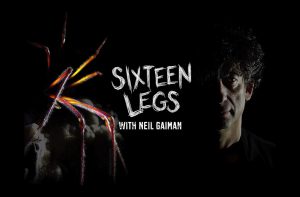 Sixteen Legs
Sixteen Legs
Sixteen Legs, the award-winning film came to campus. The one hour 40 minute documentary, which features Dr Sara Goodacre of the University’s SpiderLab, journeys into a world like no other on earth — where giant prehistoric spiders the size of dinner plates seek kinky love in the dark.
Dr Goodacre features alongside a host of stars including Neil Gaiman and Stephen Fry, and the special one-off free screening and Q&A at Lakeside Arts saw a packed auditorium.
Research news
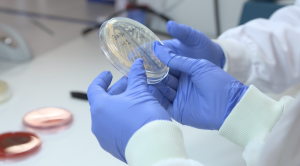 In research news, a new type of medical examination glove — that has built-in antimicrobial technology proven to prevent the spread of infection — has been developed with help from University of Nottingham scientists.
In research news, a new type of medical examination glove — that has built-in antimicrobial technology proven to prevent the spread of infection — has been developed with help from University of Nottingham scientists.
The Telegraph and BBC Radio Nottingham reported on the medical glove that instantly kills bacteria. Professor Emeritus Richard James has been working for several years on the project with medical glove makers Hartalega Malaysia and antimicrobial research and development company Chemical Intelligence UK.
The product has been in the research and development phase for over six years with millions of dollars of funding already being channelled into it and various stages of testing completed. The gloves will be available in hospitals around the world because the manufacturing partnership will make sure the product is being produced at a low cost in order to prevent barriers to access.
Professor James said the invention is a “game changer for the healthcare industry.”
“No monsters, but wonders”
“Here at the edge of the map there are treasures to be found, a different type of gold and silver. Here there be no monsters but wonders.” (Luke Saddler)
Plastic is damaging planet Earth. There are 500 times more pieces of microplastic in the sea than there are stars in our galaxy and by 2050 it is estimated there will be more plastic than fish.
A captivating and enthralling film, which featured in the final Springwatch episode of the year, highlights the horrors of plastic pollution, and in this case, how it is threatening Scotland’s marine wildlife.
The poignant piece, which captures stunning images of seals, dolphins and basking sharks, was the work of cameraman Luke Saddler, who graduated from the University’s School of Life Sciences in 2008. He speaks of his deep love of the Hebridean islands, which he describes as “more Caribbean than Caledonian” and his evocative narrative and images reveal the special connection he feels with the region.
Scroll 10 minutes into the Springwatch episode to watch Luke’s film. Image kindly provided by Luke Saddler. See more via his Instagram and on Twitter @LukeSaddler.
The University is taking action to reduce the consumption of single-use plastics.
Although proud to be one of the UK’s most sustainable universities, we can always do more. Over 3,000 people responded to a survey on single-use plastics, with 99% of respondents supporting the University taking action to reduce consumption of single-use plastics.
The responsibility to reduce plastics and join the eco-war lies with everyone. Click here to discover the University’s plastics challenge
“Softly, in the dusk, a woman is singing to me” (extract from The Piano, DH Lawrence)
The University announced in June the exciting news that it had acquired a treasure trove of personal items belonging to Nottingham’s most famous literary son, DH Lawrence.
The archive of over 600 items was bought by the University following a successful fundraising campaign to secure the collection, which was at significant risk of being sold overseas or dispersed among private collectors.
The collection of items is intimate in nature and includes drafts of published works; correspondence with family members; a diary entry; papers; and some of Lawrence’s personal possessions.
East Midlands Today‘s Carolyn Moses came onto campus with a television crew to film some of the items from the newly acquired DH Lawrence collection and to talk to Dr Andrew Harrison, Director of the University’s DH Lawrence Research Centre, and Mark Dorrington, Keeper of Manuscripts and Special Collections.
Carolyn was particularly captivated by one item… a notebook from Lawrence’s time as a student, at what was then, Nottingham’s University College. At the front of the notebook are some quite serious lesson notes. But on turning the book over to the back, you have insight into what was going on in Lawrence’s mind — some of his draft poems, and a plot line to one of his greatest novels Sons and Lovers.
Andy Whittaker of BBC Radio Nottingham came along to talk to Andrew and Mark to view the collection and said it was “an amazing privilege” to see some of the items up close. He added that by talking to the experts he “learnt so much about DH Lawrence.”
Charlotte Swindells also visited Manuscripts and Special Collections to film the collection for Notts TV. Her video can be seen here.
And finally…
A mum with an extreme fear of falling took to the air — to skydive from 10,000 feet — to raise money for brain tumour research at the University of Nottingham. Emma Ockwell’s teenage daughter Ellie, had a cancerous tumour the size of a golf ball removed just 15 months ago.
Ellie now looks the picture of health, but the removal of the tumour, which took a year to diagnose, left her with a mini stroke and having to relearn to walk and write.
Inspired by her determination and to recognise her daughter’s courage, Emma conquered her fear by doing the tandem skydive. The funds raised will go to the University’s Children’s Brain Tumour Research Centre. CBTRC has hundreds of frozen samples of brain tumour used to explore new treatments.
Dr Ruman Rahman, Assistant Professor of Molecular Neuro-Oncology, said: “I can only imagine how difficult it was to break Emma’s phobia by skydiving from 10,000 feet, so it’s incredibly courageous.”
No comments yet, fill out a comment to be the first

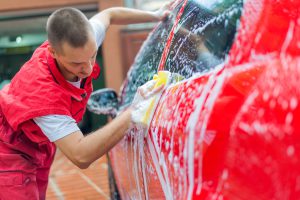
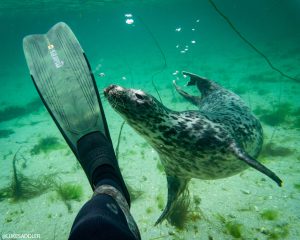
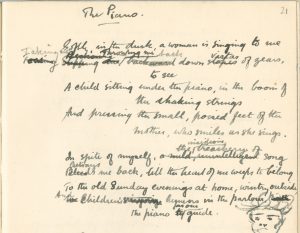
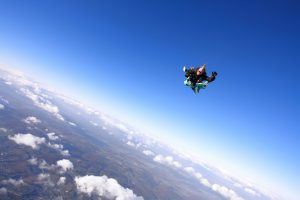
Leave a Reply